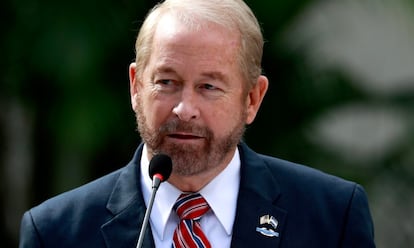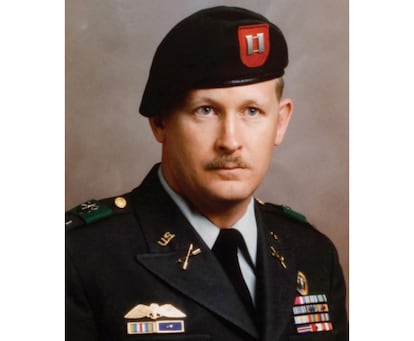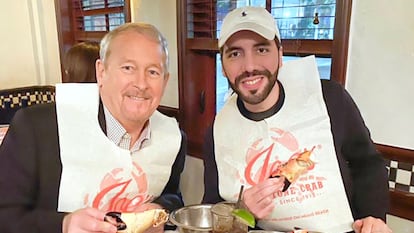Ronald Johnson, Trump’s hawk in Mexico
The ambassadorial candidate will be responsible for faithfully implementing the immigration and anti-drug policies of the incoming Republican president

One month after his election victory, Donald Trump has ended the speculation. Last week, the president-elect announced his choice of retired Colonel Ronald Johnson, a former Green Beret with extensive experience in U.S. intelligence, as the next ambassador to Mexico. “Together, we will put an end to migrant crime, stop the illegal flow of fentanyl and other dangerous drugs into our country and, make America safe again,” Trump declared about his latest move in what has already become a tense chess game with Mexican authorities.
After threats of mass deportations, trade disputes, and increased pressure on drug trafficking, as well as tense early interactions with Mexico’s President Claudia Sheinbaum, Trump has appointed Johnson, a decorated soldier and close ally of the Republican. Johnson will be the most visible face of the president-elect’s policy toward Mexico, a relationship critical to both nations. Their shared ties include a commercial exchange valued at one million dollars per minute and a 1,960-mile border crossed by a million people daily.
Johnson will also be responsible for implementing Trump’s vision for Mexico, in a similar role as the one he fulfilled during his brief tenure as ambassador to El Salvador from September 2019 to January 2021, during Trump’s first term. That assignment was Johnson’s only prior experience as a top diplomatic representative.
“Trump will look for a profile that is loyal above all, because that is his number one criterion for appointments. A person who is loyal to him, to his project, who will carry out his agenda for Mexico without question and in the most direct way possible,” says Stephanie Brewer, director for Mexico of the Washington Office on Latin America (WOLA).
According to Brewer, Trump’s vision for Mexico is “extremely transactional, focused on migration, drug control, and certain commercial issues to counteract China’s influence. The goal is to reduce, as much as possible, the number of people arriving at the southern U.S. border and secure new agreements with Mexico so that it accepts the deportation of non-Mexicans to Mexican territory. In drug control, Trump and his advisors have proposed actions, including military intervention, by U.S. forces in Mexico in an effort to project an image of a strongman who addresses problems.”
Johnson’s appointment reinforces the decisive, hardline image Trump seeks to project to Mexico and the broader Latin American region. Before serving as ambassador to El Salvador, Johnson had a long career in the U.S. Army, including extensive service in Latin America and the U.S. secret services.
Military and intelligence agent
A graduate of the State University of New York and a former instructor at the National Intelligence University, Johnson’s military background has drawn significant attention in Mexico. “His appointment sends a clear message that the priority will be security cooperation and combating organized crime in all its dimensions: drug trafficking, human smuggling, arms trafficking, and corruption involving politicians protecting cartels,” says Martha Bárcena, who served as Mexico’s ambassador to Washington during Trump’s first term.
Johnson’s military career began in Panama. In the 1980s, he was stationed in El Salvador as one of 55 U.S. military advisors during the country’s brutal civil war. A specialist in covert operations, he became a member of the elite U.S. Special Forces, informally known as the “Green Berets” — a highly selective unit that also included figures like future National Security Advisor Mike Waltz.

After leaving the Army, Johnson transitioned to the CIA, where he served for two decades as an operative in high-risk zones, including Iraq, Afghanistan, and the Balkans. In the 1990s, he was part of an operations group tasked with tracking and capturing individuals accused of war crimes in the former Yugoslavia. At the Central Intelligence Agency, Johnson rose to lead the Air, Land, Maritime, and Paramilitary departments, and was in charge of overseeing paratrooper operations. He also served as an advisor to the U.S. Southern Command, which handles Latin American affairs — excluding Mexico.
The résumé of Johnson — who has been married for 40 years to Cuban-born Alina Arias, with whom he has four children — paints a picture of a man of action across sky, sea, and land. He is an expert parachutist, an avid diver and has a black belt in taekwondo. Johnson “represents Trump’s vision and project and the message that [the president-elect] wants to project: a militarized message, of playing the role of a strongman and of negotiating hard,” explains Brewer. “And that approach will not only be played out in Washington or in the bilateral forums between the two countries, but in the daily operations from the Embassy in Mexico.”
Martha Bárcena, Mexico’s ambassador to Washington during Trump’s first term, underscores that Johnson’s intelligence background could significantly shape his perspective on Latin America, as well as his priorities as ambassador. “His outlook could be influenced by the framework of the Southern Command,” she notes, referring to his earlier advisory role there. Johnson himself has described his appointment to El Salvador as “the greatest honor” of his professional career. However, Bárcena emphasizes that the challenges in Mexico City will be far greater. “Obviously, the differences between the two countries are immense — not only in size and population but in the complexity, challenges, and interdependence of the bilateral relationship,” she explains.
Johnson’s nomination as ambassador to Mexico caps off a foreign policy team that blends experience in Latin America with a focus on security. The team includes Florida Senator Marco Rubio, Trump’s nominee for Secretary of State, and Chris Landau, a former U.S. ambassador to Mexico who will become Deputy Secretary of State. Both Johnson and incoming National Security Advisor Michael Waltz — also a former Green Beret — bring extensive experience in covert operations, particularly in Latin America.
Arturo Sarukhán, Mexico’s ambassador to the United States during Felipe Calderón’s presidency, highlights the influence of the “Florida factor” in Johnson’s nomination, which still requires Senate confirmation. “This was not a proposal from Trump but rather from Rubio and Waltz,” argues Sarukhán. “That means that, although he will not have a direct line of communication with Trump, he will have one with Rubio and Waltz, who are well aware of the general context of the bilateral relationship and have tough positions regarding the legacy left by the security policies of [former Mexican president] Andrés Manuel López Obrador.”
Lessons from El Salvador
Johnson’s tenure in El Salvador has many parallels with the post in Mexico. Trump appointed him to address Central American gang violence, curb migration flows, and counteract the growing influence of China — concerns that also resonate in the U.S.-Mexico relationship. In El Salvador, Johnson’s military credentials and unconventional diplomatic background stood out, much as they do now.
In El Salvador, Johnson’s military background and unique profile among his diplomatic predecessors did not go unnoticed. Sarukhán recalls only one comparable precedent: John Negroponte. A former CIA official, Negroponte was a controversial figure who orchestrated Washington’s strategy to support the Contras from Honduras during the 1980s — a period that coincided with Johnson’s own deployment in El Salvador. Negroponte later served as U.S. ambassador to Mexico from 1989 to 1993 under president George H.W. Bush.

From his first days in San Salvador, the former colonel quickly built a strong relationship with President Nayib Bukele, grounded not only in personal affinities but also in a pragmatic, transactional understanding. If the Salvadoran authorities aligned with the White House’s objectives, the Republican was willing to overlook internal political matters that had previously strained relations between the two countries. Sarukhán points out, for instance, that the incoming U.S. administration will likely focus on Mexico’s “protection” of regimes like Cuba, Nicaragua, and Venezuela, or even their “flirtation with Moscow.” Bárcena agrees that the new ambassador will focus on “anti-communist” sentiment.
Oscar Chacón, a spokesperson for the pro-migrant network Alianza Américas, describes Johnson as “an extremely pragmatic man” who prioritizes achieving results over the political beliefs of his interlocutors. “His pragmatism is not tied to ideological paradigms, even though he holds them,” Chacón explains.
According to some experts, security will also be one of the key issues in bilateral relations over the next four years. “Security is going to be a key area, especially with regard to China’s presence in Latin America,” said Bonnie Glick, who deputy admin of the United States Agency for International Development (USAID) during Trump’s term in office, last week.
Glick is optimistic about the future of U.S.-Latin America relations, which have often taken a backseat despite repeated promises from previous administrations. “For the first time, we will have a secretary of state and an assistant secretary of state who are both experts on Latin America. Marco Rubio and Chris Landau, our former ambassador to Mexico, both speak fluent Spanish and are deeply committed to U.S. relations with the Americas. We said are going to see a strengthened interest in the Western Hemisphere,” said Glick, who is now an adjunct senior fellow at the Foundation for Defense of Democracies.
Meanwhile, U.S. Ambassador Ken Salazar, appointed by the Biden administration, announced he will return to the U.S. on January 7, two weeks before Trump’s inauguration. Salazar, with a more political profile, had a close relationship with López Obrador until disagreements over judicial reform and organized crime distanced them last August. Johnson, on the other hand, appears to follow a line more akin to Chris Landau’s, focusing less on political ideology and more on achieving specific objectives aligned with U.S. national interests in Mexico.
The main uncertainty in the U.S.-Mexico relationship — and Johnson’s upcoming mission — lies in whether the two countries can collaborate effectively beyond their differences, reaching agreements that benefit both sides. Sheinbaum has expressed a desire to find common ground, hoping to manage Trump’s threats while keeping essential cross-border relations intact. Unlike Bukele, however, the Mexican president has insisted on “cooperation, not subordination,” and has emphasized that she expects “equal treatment” from the White House’s next representative. After undergoing the necessary procedures and protocols, Johnson is expected to arrive in Mexico by the first months of 2025.
Sign up for our weekly newsletter to get more English-language news coverage from EL PAÍS USA Edition
Tu suscripción se está usando en otro dispositivo
¿Quieres añadir otro usuario a tu suscripción?
Si continúas leyendo en este dispositivo, no se podrá leer en el otro.
FlechaTu suscripción se está usando en otro dispositivo y solo puedes acceder a EL PAÍS desde un dispositivo a la vez.
Si quieres compartir tu cuenta, cambia tu suscripción a la modalidad Premium, así podrás añadir otro usuario. Cada uno accederá con su propia cuenta de email, lo que os permitirá personalizar vuestra experiencia en EL PAÍS.
¿Tienes una suscripción de empresa? Accede aquí para contratar más cuentas.
En el caso de no saber quién está usando tu cuenta, te recomendamos cambiar tu contraseña aquí.
Si decides continuar compartiendo tu cuenta, este mensaje se mostrará en tu dispositivo y en el de la otra persona que está usando tu cuenta de forma indefinida, afectando a tu experiencia de lectura. Puedes consultar aquí los términos y condiciones de la suscripción digital.








































